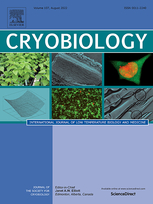
Subzero nonfreezing storage of the mammalian cardiac explant. 1. Methanol, ethanol, ethylene glycol, and propylene glycol as colligative cryoprotectants.
Author(s) : YANG X., ZHU Q., LAYNE J. R. Jr, CLAYDON M., HICKS G. L. Jr, WANG T.
Type of article: Article
Summary
The authors employed hyperosmotic concentrations of penetrating cryoprotective agents to store the isolated rat hearts unfrozen at subzero temperatures. The effect of acute exposure to cryoprotective agents was assessed by flushing the hearts with CP-14, a cardioplegic solution, containing methanol, ethanol, ethylene glycol, or propylene glycol for 2 minutes and reperfusing immediately with Krebs-Henseleit buffer in a working-heart model. For nonfreezing storage, the hearts were flushed with CP-14 containing the highest tolerable concentration of the same four substances, stored for 6 hours at -3.7, -2.8, and -1.4 deg C, respectively, and then reperfused. Nonfreezing storage at subzero temperatures using these cryoprotective agents may provide a novel approach to long-term cardiac preservation.
Details
- Original title: Subzero nonfreezing storage of the mammalian cardiac explant. 1. Methanol, ethanol, ethylene glycol, and propylene glycol as colligative cryoprotectants.
- Record ID : 1994-1877
- Languages: English
- Source: Cryobiology - vol. 30 - n. 4
- Publication date: 1993/08
Links
See other articles in this issue (8)
See the source
Indexing
- Themes: The influence of refrigeration on cells, tissues and organs
- Keywords: Cryoprotectant; Cryobiology; Temperature; Chilling; Survival; Mammal; Heart
-
Protective effects of amino acids against freez...
- Author(s) : KRUUV J., GLOFCHESKI D. J.
- Date : 1992/04
- Languages : English
- Source: Cryobiology - vol. 29 - n. 2
View record
-
Effects of storage temperature on viable biopro...
- Author(s) : BROCKBANK K. G. M., CARPENTER J. F., DAWSON P. E.
- Date : 1992/10
- Languages : English
- Source: Cryobiology - vol. 29 - n. 5
View record
-
Freezing preservation of the mammalian cardiac ...
- Author(s) : BANKER M. C., LAYNE J. R. Jr, HICKS G. L. Jr, et al.
- Date : 1992/02
- Languages : English
- Source: Cryobiology - vol. 29 - n. 1
View record
-
A SIMPLE GLYCEROL-BASED FREEZING PROTOCOL FOR T...
- Author(s) : RODGER J. C., COUSINS S. J., MATE K. E.
- Date : 1991
- Languages : English
- Source: Reprod. Fertil. Dev. - vol. 3 - n. 2
View record
-
Effect of sub-zero non-freezing storage on the ...
- Author(s) : SATO K.
- Date : 1992/06
- Languages : English
- Source: Low Temperature Medicine - vol. 18 - n. 2
View record
